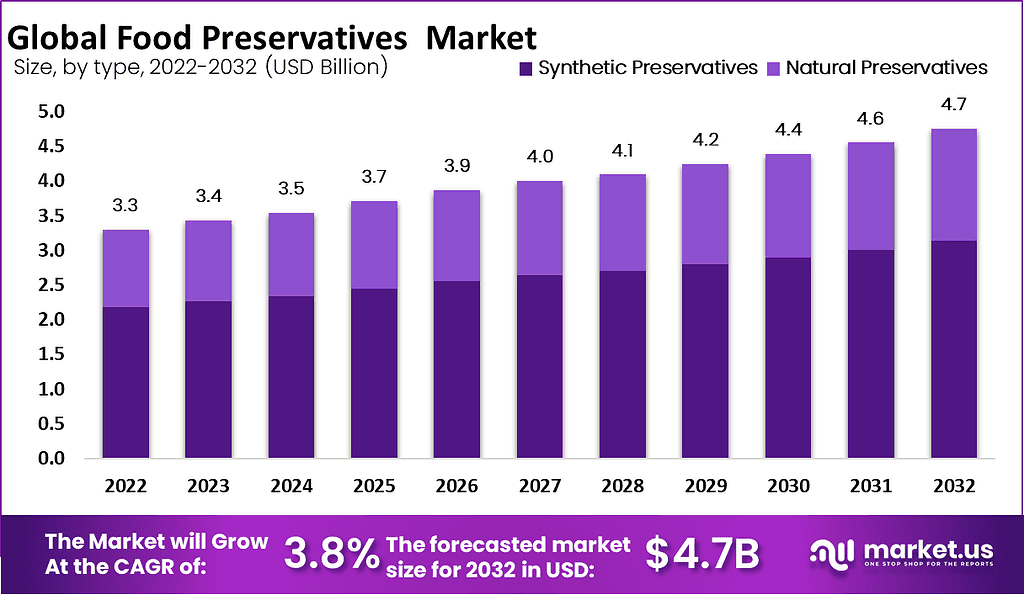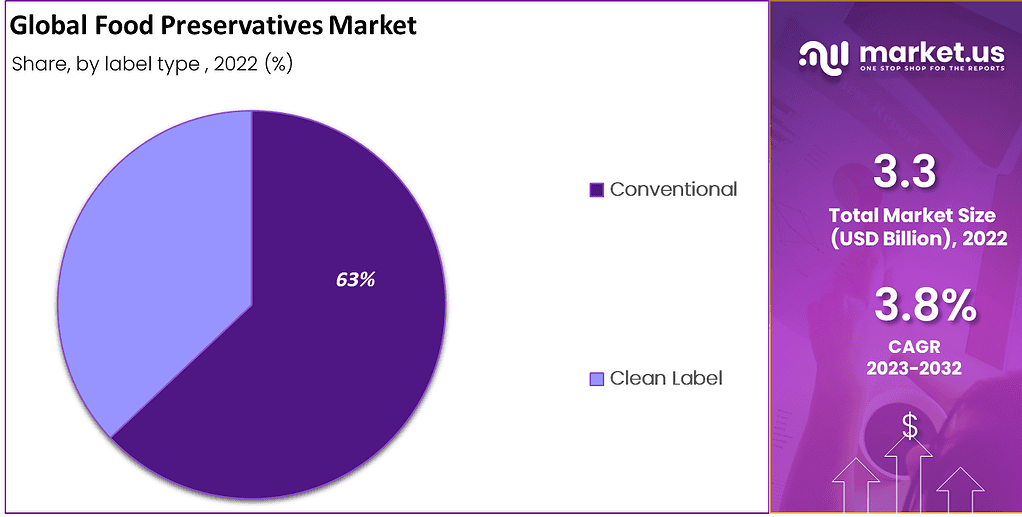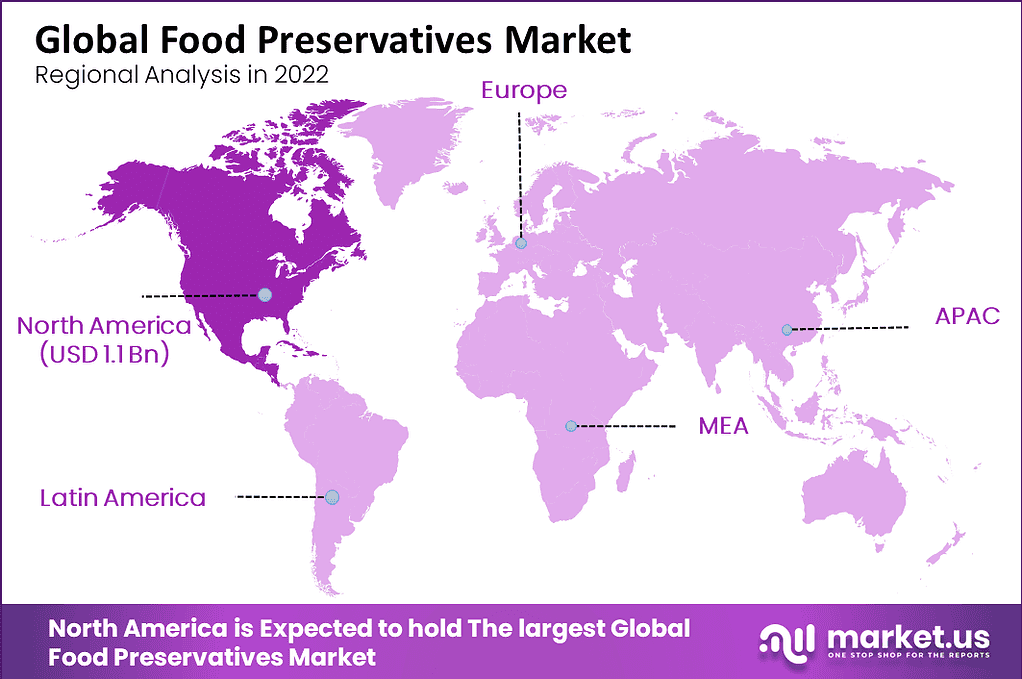New York, Feb. 07, 2024 (GLOBE NEWSWIRE) -- According to Market.us, the Global Food Preservatives Market measure is expected to be worth around USD 4.7 Billion by 2032 from USD 3.3 Billion in 2023, growing at a CAGR of 3.8% during the forecast period from 2022 to 2032.
The Food Preservatives Market refers to the industry involved in the production, distribution, and utilization of substances or compounds added to food products to extend their shelf life, inhibit spoilage, prevent microbial growth, and maintain overall freshness and quality.
These preservatives play a crucial role in ensuring food safety, reducing food waste, and meeting consumer demand for convenient and long-lasting food items. They are employed in a variety of food and beverage categories to enhance product stability and maintain sensory attributes while complying with regulatory standards.
The report analyses the market size and growth and provides accurate predictions on the growth of the market. View PDF Sample @ https://market.us/report/food-preservatives-market/request-sample/

Important Revelation:
- Market Valuation: The Healthy Snack Market was valued at USD 84.4 billion in 2022, with a projected 5.5% compound annual growth rate until 2032.
- Pandemic Impact: The market experienced a surge post-pandemic as health-conscious consumer demand rose, and supermarkets collaborated with online services for expanded commerce.
- Definition of Healthy Snacks: These snacks have reduced sodium, sugar, and saturated fat, providing proteins and fiber for sustained energy delivery.
- Dominant Product Types: Nuts, Seeds, and Trail Mixes dominate with high protein content and ease of consumption, gaining popularity in vegan diets.
- Distribution Channels: Supermarkets and hypermarkets held sway in 2022, benefiting from rapid retail infrastructure development in emerging economies.
- Regional Dominance: North America, led by the U.S., dominated in 2022, with Europe following closely. Asia-Pacific markets show potential for explosive growth.
Factors Affecting the Growth of the Global Food Preservatives Market
- Increasing Demand: Growing consumer demand for extended shelf life and natural preservation methods drives market growth.
- Health and Wellness Trend: Rising awareness of healthier food choices encourages the use of natural and organic preservatives.
- Product Innovation: Ongoing research and development for effective and sustainable preservatives fuel market expansion.
- Changing Consumer Lifestyles: Busy lifestyles and a preference for convenience drive the demand for preserved and ready-to-eat food products.
- Globalization of Food Supply: Expansion of the global food supply chain necessitates effective preservation methods for longer product shelf life.
- Stringent Food Safety Regulations: Compliance with strict food safety regulations boosts the adoption of safe and approved preservatives.
- Technological Advancements: Continuous advancements in preservation technologies contribute to the market's growth.
Plan your Next Best Move. Purchase the Report for Data-driven Insights: https://market.us/purchase-report/?report_id=16087
Some of The Recent Developments Food Preservatives Market Are:
Cargill Inc.:
- 2022: Launched "Altra Clean Label Solutions," a platform offering natural and clean-label preservatives alongside expertise in formulation and application.
- 2021: Partnered with Corbion to develop innovative bio-based preservatives.
- 2020: Expanded its portfolio of organic acid preservatives, catering to clean-label demand.
Kemin Industries Inc.:
- 2023: Launched "KemGuard™ Nature," a line of plant-based antimicrobials derived from essential oils.
- 2022: Expanded its "Shield®" range of clean-label preservatives for bakery and meat applications.
- 2021: Developed new solutions for extending shelf life in plant-based beverages.
ADM:
- 2023: Focused on expanding its natural preservative offerings through acquisitions and partnerships (e.g., Bio-Cote).
- 2022: Launched "HOMECRAFT by Ingredion" with natural preservatives for home cooks.
- 2021: Partnered with Kerry Group to develop clean-label solutions for meat alternatives.
Koninklijke DSM N.V.:
- 2023: Collaborated with Evonik to develop sustainable bio-based preservatives.
- 2022: Launched "DelvoGuard® 100" for shelf life extension in dairy products.
- 2021: Introduced "Delvo®Clean" solutions for clean-label preservation in meat and poultry.
BASF SE:
- 2023: Expanded its "Bactiguard®" antimicrobial packaging technology to various food applications.
- 2022: Launched "Celanese™ InnoPreserve," a natural preservative derived from rosemary extract.
- 2021: Partnered with Döhler to develop solutions for extending shelf life in plant-based foods.
Top Key Players
- Cargill Inc.
- Kemin Industries Inc.
- ADM
- Koninklijke DSM N.V.
- BASF SE
- Celanese Corporation
- Corbion N.V.
- Galactic S.A.
- Kerry Group Plc.
- Archer Daniels Midland Company
- Tate & Lyle PLC
- Hansen Holding A/S
- Other Key Players
Scope of the Report
| Report Attributes | Details |
| Market Value (2023) | USD 3.3 Billion |
| Forecast Revenue 2033 | USD 4.7 billion |
| CAGR (2023 to 2032) | 3.8% |
| North America Revenue Share | 34% |
| Base Year | 2023 |
| Historic Period | 2018 to 2022 |
| Forecast Year | 2023 to 2032 |
Request for Research Methodology to Understand Our Data-sourcing Process in Detail: https://market.us/report/food-preservatives-market/request-sample/
Report Segmentation
By Type Analysis
The food preservatives market is categorized into synthetic and natural preservatives. The dominant segment is synthetic preservatives, contributing 66% of the market revenue in 2022. Synthetic preservatives act as antioxidants, reducing moisture, slowing ripening, and preventing microorganism growth, enhancing fast food shelf life. Increased demand in meat, poultry, and snacks fuels this segment's growth.
The natural preservatives segment is poised for the fastest CAGR, driven by safety and convenience. Ingredients like neem oil and rosemary extracts meet the rising consumer preference for healthier choices, boosting the demand for natural food preservatives.
By Label Type Analysis
The food preservatives market is categorized into clean label and conventional segments based on label type. The dominant segment is conventional, contributing 63% of the market revenue in 2022. Conventional preservatives, encompassing methods like drying and pasteurization, enhance food shelf life. Antioxidants and antimicrobial preservatives are commonly used.
The clean-label segment is projected to have the fastest CAGR, driven by consumer preferences for natural, additive-free products. The clean label indicates products are free from chemical additives, with clear ingredient lists and natural processing methods.

By Function Analysis
In the food preservatives market, the dominant segment based on function is antimicrobial, holding the largest market revenue share at 76% in 2022. This preservative is crucial for preserving pharmaceuticals, food, and organic materials by preventing microorganism growth. Examples include Methyl, Ethyl, Propyl, Sorbic Acid, and Butyl Parabens, with significant applications in cosmetics and personal care products.
Antimicrobials control foodborne bacteria, inhibit spoilage microorganisms, and extend shelf life. The antioxidant segment is expected to grow at the fastest CAGR, preventing food rancidity and preserving nutritional properties in high demand in the food industry.
By Application Analysis
In the food preservatives market, the dominant application segment is meat & poultry products, holding the largest market revenue share at 35% in 2022. The increasing demand for meat and poultry products, including seafood, propels this segment's growth. Preservatives like sodium lactate and potassium lactate are in high demand for poultry and meat, enhancing shelf life and combating bacteria. Antioxidants such as BHT and BHA in meat products preserve qualities by slowing rancidity in fats, sausages, and dried meats. The bakery products segment is anticipated to experience the fastest CAGR during the forecast period.
Key Market Segments
By Type
- Synthetic Preservatives
- Natural Preservatives
By Label Type
- Clean Label
- Conventional
By Function
- Antimicrobial
- Antioxidant
- Other Functions
By Application
- Meat & Poultry Products
- Bakery Products
- Dairy Products
- Beverages
- Snacks
- Other Applications
Methodology Details Just a Click Away: https://market.us/report/food-preservatives-market/request-sample/
Impactful Driver: Technological Advancements
The food preservatives market is growing due to increased consumer preference for ready-to-eat foods with extended shelf life. The demand for natural food preservatives is rising as consumers prioritize food safety. Advances in food processing and packaging technologies contribute to the development of innovative preservatives, driving market growth.
Higher disposable incomes lead to increased spending on processed foods, reducing food waste and environmental footprints. The expanding food and beverage industry, especially in dairy products, witnesses high demand for common preservatives like sorbate, natamycin, and benzoate. This trend aligns with the growing population, rising incomes, and increased demand for dairy products, fueling the market's growth.
Restraining Factors
The market faces obstacles due to health risks associated with certain food preservatives. Sodium nitrate and sodium nitrite, commonly used in meat preservation, are linked to an elevated cancer risk. Allergic reactions, including hives, swelling, and breathing difficulties, can occur in individuals sensitive to preservatives. Additionally, preservative use may contribute to nutrient loss in food, diminishing the nutritional value of food products.
Growth Opportunity
The global food preservatives market is poised for rapid growth, driven by the surging demand for processed and packaged foods. With busy lifestyles and higher disposable incomes, consumers seek convenient food options with extended shelf life, making food preservatives crucial in the industry. The emphasis on reducing food waste also contributes to the market's expansion. Moreover, the preference for natural and organic preservatives, such as vinegar, salt, and spices, presents growth opportunities. Consumers increasingly favor clean-label products, spurring demand for safe and convenient food options and fostering trends in natural and organic food preservatives.
Regional Analysis
In 2022, North America claimed the dominant position in the food preservatives market, holding the largest revenue share at 34%. The region's growth is fueled by a rising demand for safe food options and a push to reduce food waste. Developed economies like the US, Canada, and Mexico witness increased consumer preference for natural and minimally processed foods due to heightened health concerns.
The market in North America is further boosted by a surge in the consumption of ready-to-eat packaged food products. Looking ahead, the Asia Pacific region is poised to exhibit the fastest Compound Annual Growth Rate (CAGR) in the forecast period, driven by a growing demand for dairy products and increasing needs in the food industries.

By Geography
- North America
- The US
- Canada
- Europe
- Germany
- France
- The UK
- Spain
- Italy
- Russia
- Netherland
- Rest of Europe
- APAC
- China
- Japan
- South Korea
- India
- Australia
- New Zealand
- Singapore
- Thailand
- Vietnam
- Rest of APAC
- Latin America
- Brazil
- Mexico
- Rest of Latin America
- Middle East & Africa
- South Africa
- Saudi Arabia
- UAE
- Rest of MEA
Explore Extensive Ongoing Coverage on Chemical Research Reports Domain:
- Breakfast Cereals market size is expected to be worth around USD 132.7 billion by 2033, from USD 78.6 billion in 2023, growing at a CAGR of 6.0% during the forecast period from 2023 to 2033.
- Gluten-Free Products market size is expected to be worth around USD 18.8 billion by 2033, from USD 8.1 billion in 2023, growing at a CAGR of 8.8% during the forecast period from 2023 to 2033.
- Specialty polyamides market was valued at USD 2.55 billion and is expected to reach around USD 4.8 billion in 2032. Between 2023 and 2032, this market is estimated to register a CAGR of 6.8%.
- Peanut Butter Market accounted for USD 5.0 billion and will reach USD 8.6 billion by 2032. Between 2023 and 2032, this market is estimated to register a CAGR of 5.6%.
- Herbal Tea market was valued at USD 3.5 billion and is expected to reach USD 6.9 billion in 2032. This market is estimated to register the highest CAGR of 7.2% between 2023 and 2032.
- Cider market size is expected to be worth around USD 29.4 billion by 2033, from USD 17.9 billion in 2023, growing at a CAGR of 5.1% during the forecast period from 2023 to 2033.
- Microencapsulation Market was valued at USD 11.6 Billion. This market is estimated to reach USD 31.8 Billion at the highest CAGR of 10.9% between 2023 and 2032.
- Peracetic Acid Market was valued at USD 905 million, and is projected to reach USD 1,899 Million in 2032 Between 2023 and 2032, this market is estimated to register the highest CAGR of 7.9%.
- Conductive Ink market size is expected to be worth around USD 5.6 billion by 2033, from USD 3.5 billion in 2023, growing at a CAGR of 6.3% during the forecast period from 2023 to 2033.
- Ammonium nitrate market size is expected to be worth around USD 9.1 billion by 2033, from USD 6.1 billion in 2023, growing at a CAGR of 4.2% during the forecast period from 2023 to 2033.
About Us
Market.US (Powered by Prudour Pvt Ltd) specializes in in-depth market research and analysis and has been proving its mettle as a consulting and customized market research company, apart from being a much sought-after syndicated market research report-providing firm. Market.US provides customization to suit any specific or unique requirement and tailor-makes reports as per request. We go beyond boundaries to take analytics, analysis, study, and outlook to newer heights and broader horizons.
Follow Us On LinkedIn Facebook Twitter
Our Blog:
